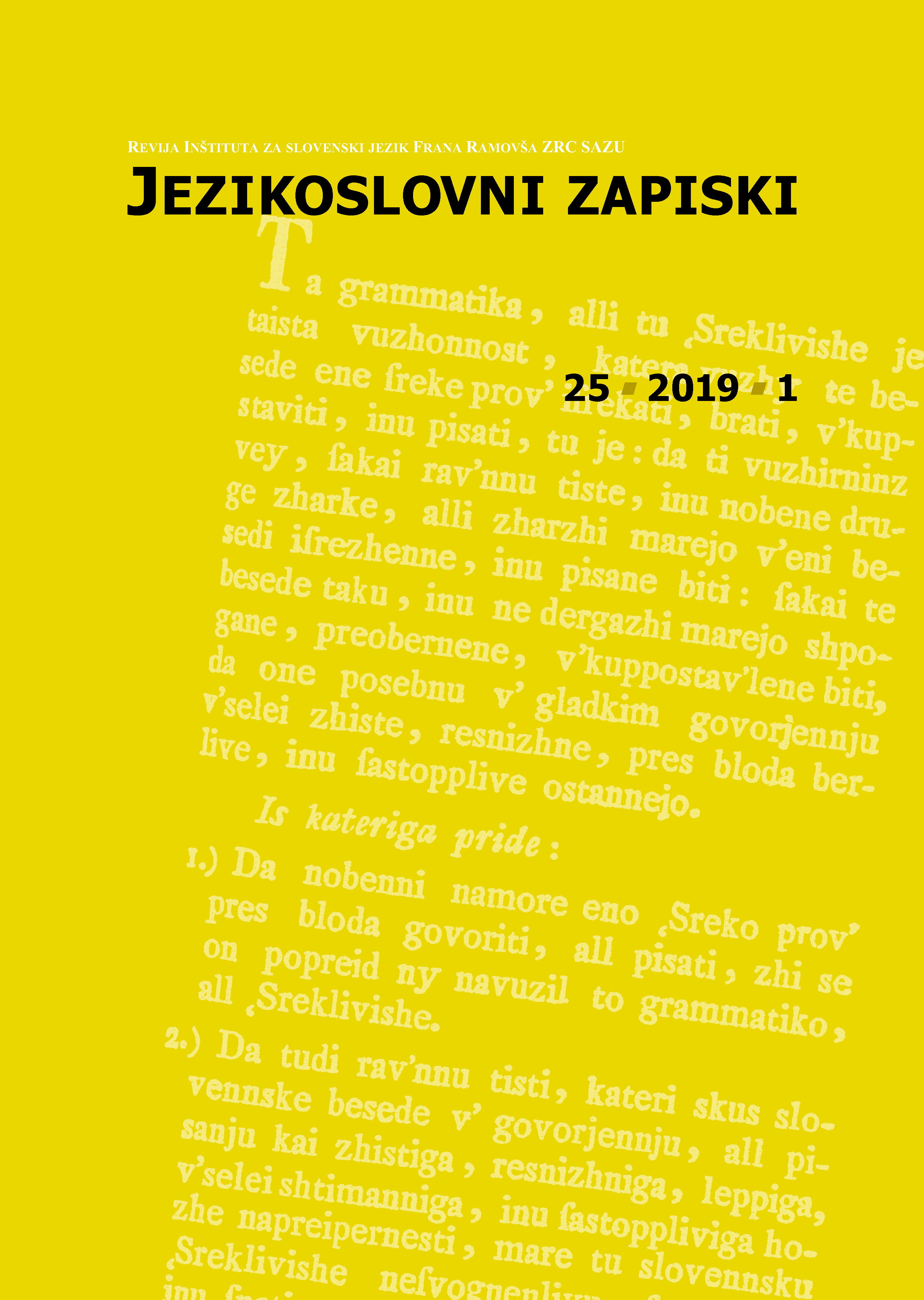Triggering Negative Emotions Gives Pejorative Lexis an Important Role in Communication
DOI:
https://doi.org/10.3986/jz.v25i1.7570Keywords:
appraisal, judgement, pejorative lexis, points of attackAbstract
This article analyzes pejoratives in German and Croatian internet comments on terrorist attacks in line with Havryliv’s points of attack: (1) character traits and type of behavior of the addressee, (2) appearance, physical defects, and age of the addressee, (3) universal swearwords with an abstract meaning, (4) regional and national insults, and (5) career insults. It also utilizes the judgement category of Martin and White’s (2005) appraisal theory; that is, how special, capable, dependable, honest, or beyond reproach somebody is.Downloads
References
Anderson – Lepore 2013 = Luvell Anderson – Ernie Lepore, Slurring Words, Noûs 47.1 (2013), 25–48.
Bednarek 2006 = Monika Bednarek, Evaluation in Media Discourse: Analysis of a Newspaper Corpus, New York – London: Continuum, 2006.
Bonacchi 2012 = Silvia Bonacchi, Zu den idiokulturellen und polykulturellen Bedingungen von aggressiven Äußerungen im Vergleich Polnisch-Deutsch-Italienisch, in: Magdalena Olpińska- Szkiełko u. a. (Hrsg.), Der Mensch und seine Sprachen: Festschrift für Professor Franciszek Grucza, Frankfurt am Main u. a.: Peter Lang Verlag, 2012, 1–20.
Bonacchi 2017 = Silvia Bonacchi, Sprachliche Aggression beschreiben, verstehen und erklären, in: Silvia Bonacchi (Hrsg.), Verbale Aggression: multidisziplinäre Zugänge zur verletzenden Macht der Sprache, Berlin – Boston: Walter de Gruyter, 2017, 3–31.
Croom 2013 = Adam M. Croom, How to do things with slurs: studies in the way of derogatory words, Language & Communication 33 (2013), 177–204.
Finkbeiner – Meibauer – Wiese 2016 = Rita Finkbeiner – Jörg Meibauer – Heike Wiese, What is pejoration, and how can it be expressed in language?, in: Rita Finkbeiner – Jörg Meibauer – Heike Wiese (Hrsg.), Pejoration, Amsterdam – Philadelphia: John Benjamins Publishing Company, 2016, 1–18.
Frljužec – Perić 2017 = Katarina Frljužec – Marija Perić, Valovi kao jezični izraz emocija, Zadarski filološki dani 6 (2017), 315–336.
Havryliv 2009 = Oksana Havryliv, Verbale Aggression, Frankfurt am Main u. a.: Peter Lang, 2009.
Hughes 2006 = Geoffrey Hughes, An Encyclopedia of Swearing: The Social History of Oaths, Profanity, Foul Language, and Ethnic Slurs in the English-Speaking World, Armonk, NY – London: M. E. Sharpe, 2006.
Hunston 1993 = Susan Hunston, Evaluation and ideology in scientific writing, in: Mohsen Ghadessy (Hrsg.), Register Analysis: Theory and Practice, London: Pinter Publishing, 1993, 57–73.
Hunston 2011 = Susan Hunston, Corpus Approaches to Evaluation: Phraseology and Evaluative Language, New York – Oxford: Routledge, 2011.
Jahr 2000 = Silke Jahr, Emotionen und Emotionsstrukturen in Sachtexten, Berlin: Walter de Gruyter, 2000.
Jay – Jay 2015 = Kristin L. Jay – Timothy B. Jay, Taboo word fluency and knowledge of slurs and general pejoratives: deconstructing the poverty-of-vocabulary myth, Language Sciences 52 (2015), 251–259.
Kiener 1983 = Franz Kiener, Das Wort als Waffe: zur Psychologie der verbalen Aggression, Göttingen: Vandenhoeck & Ruprecht, 1983.
Lobenstein-Reichmann 2012 = Anja Lobenstein-Reichmann, Verbale Gewalt: ein Forschungsgegenstand der Sprachgeschichtsschreibung, in: Peter Ernst (Hrsg.), Historische Pragmatik: Tagungsband zur Jahrestagung der Gesellschaft für Historische Sprachwissenschaft 2011, Berlin – Boston: de Gruyter, 2012, 215–238.
Martin 2001 = J. R. Martin, Beyond exchange: appraisal systems in English, in: Susan Hunston – Geoff Thompson (Hrsg.), Evaluation in Text: Authorial Stance and the Construction of Discourse, Oxford – New York: Oxford University Press, 2001, 142–175.
Martin – White 2005 = J. R. Martin – P. R. R. White, The Language of Evaluation: Appraisal in English, London: Palgrave Macmillan, 2005.
Meibauer 2014 = Jörg Meibauer, Bald-faced lies as acts of verbal aggression, Journal of Language Aggression and Conflict 2.1 (2014), 127–150.
Mieder 1993 = Wolfgang Mieder, “The Only Good Indian Is a Dead Indian”: History and Meaning of a Proverbial Stereotype, The Journal of American Folklore 106.419 (1993), 38–60.
Mikulova 2012 = Anna Mikulova, Sprachliche Bewertung in Internet-Foren zu You-Tube-Videos, Brünner Beiträge zur Germanistik und Nordistik 26 (2012), 81–103.
Millan 2012 = Enrique Lafuente Millan, A Contrastive Study of Generic Integrity in the Use of Attitudinal Evaluation in Research Articles Written for Different Audiences, Brno Studies in English 38.2 (2012), 79–96.
Millar – Hunston 2015 = Neil Millar – Susan Hunston, Adjectives, communities, and taxonomies of evaluative meaning, Functions of Language 22.3 (2015), 297–331.
Ortner 2014 = Heike Ortner, Text und Emotion: Theorie, Methode und Anwendungsbeispiele emotionslinguistischer Textanalyse, Tübingen: Narr, 2014 (Europäische Studien zur Textlinguistik 15).
Perić – Pavić Pintarić 2015 = Marija Perić – Anita Pavić Pintarić, Das Modell zur Bestimmung von Phrasemen der Bewertungskategorie Affekt, Jezikoslovni zapiski 21.2 (2015), 191–207.
Stotesbury 2003 = Hilkka Stotesbury, Evaluation in research article abstracts in the narrative and hard sciences, Journal of English for Academic Purposes 2 (2003), 327–341.
Thompson 2008 = Geoff Thompson, Appraising glances: evaluating Martin’s model of APPRAISAL, WORD 59.1–2 (2008), 169–187.
Thompson 2014 = Geoff Thompson, Affect and emotion, target-value mismatches, and Russian dolls: refining the appraisal model, in: Geoff Thompson – Laura Alba-Juarez (Hrsg.), Evaluation in Context, Amsterdam – Philadelphia: John Benjamins Publishing Company, 2014, 47–66.
Thompson – Hunston 2003 = Geoff Thompson – Susan Hunston, Evaluation: An Introduction, in: Geoff Thompson – Susan Hunston (Hrsg.), Evaluation in Text: Authorial Stance and the Construction of Discourse, Oxford – New York: Oxford University Press, 2003, 1–27.
Downloads
How to Cite
Issue
Section
License
Authors guarantee that the work is their own original creation and does not infringe any statutory or common-law copyright or any proprietary right of any third party. In case of claims by third parties, authors commit their self to defend the interests of the publisher, and shall cover any potential costs.
More in: Submission chapter





